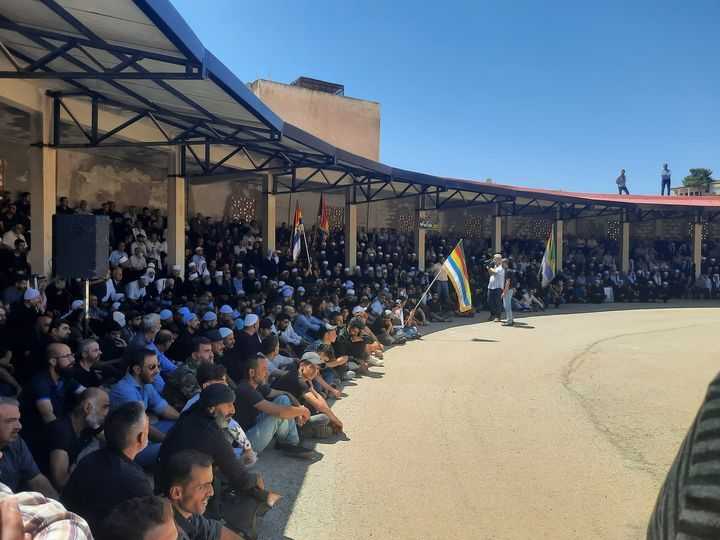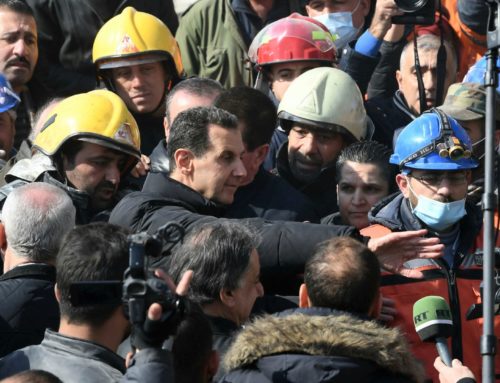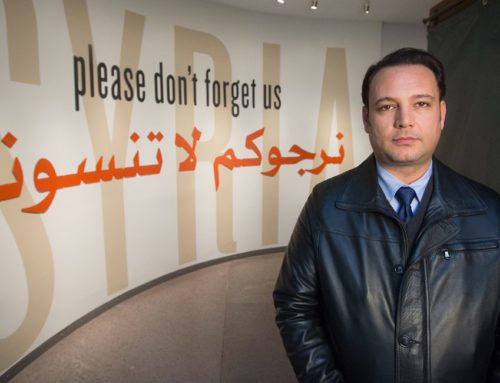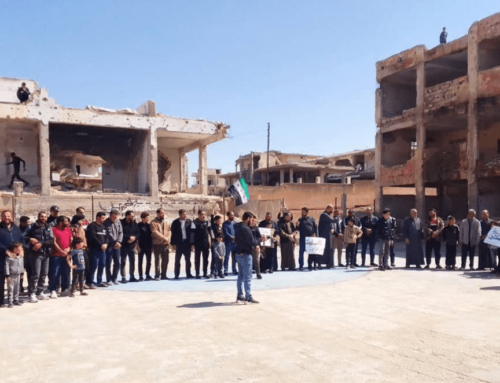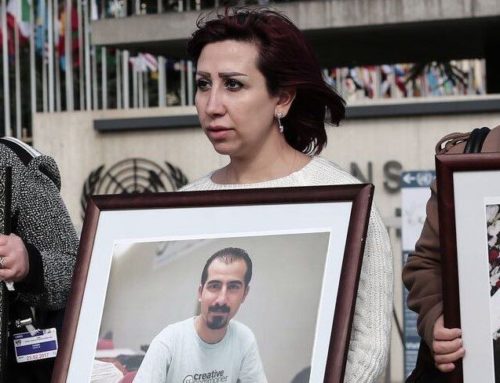Op-Ed: Will recent events in Suwayda open the door to greater discord?
The recent events in Suwayda related to the ousting of […]
1 August 2022
The recent events in Suwayda related to the ousting of the Dawn Forces militia, led by Raji Falhout, hold a number of implications that cannot be overlooked. The province has been troubled since the Syrian revolution broke out in 2011, and erupted into a popular outburst against the “Falhout group,” as the Dawn Forces militia is locally known, last week. The militia is openly associated with regime agencies, especially the military security branch, which is the guiding force in its actions, including kidnapping, killing, intimidation, drug manufacturing and humiliation.
The cumulative toll of these incidents inflamed residents irrevocably, and drove them to “uproot the gang” and destroy the Falhout group’s headquarters last week, while its leader fled to an unknown location. Although Falhout’s location cannot be determined, a review of his course for years and his open association with the security services that sponsored and supported him, hints at his importance to Damascus. Consequently, he could have been smuggled out in coordination with regime agencies in Suwayda.
Before 2011, Falhout was living abroad in Qatar. He returned to Syria when the revolution began, and has since provided services to the regime through the Dawn Forces in exchange for protection and a security card.
In November 2020, Falhout and his group kidnapped Majd Sereiwi, a young man, in the Suwayda countryside town of Ateel, where both men are originally from. Ateel was also the Falhout group’s center of operations, from kidnapping and detention to manufacturing drugs. After Sereiwi was tortured and his “confessions” broadcast through a video recording, he was killed and his body was dumped in front of the National Hospital in Suwayda city. Falhout then pressured his family to agree to reconciliation and leave the town under threat of being killed.
After the Sereiwi incident, Falhout and his group expanded their work with full support from the security services and Iran-backed Lebanese Hezbollah. They formed an armed militia made up of youth from Suwayda. With the assistance of members of military security and Hezbollah, they liquidated competitors involved in drug trafficking and smuggling in Suwayda, and undertook security operations.
The Falhout group has conducted several kidnappings and forced relatives of the hostages to pay large financial ransoms to save their lives. Repeated kidnappings were one of the factors that united the people of Suwayda in the latest campaign against Falhout.
In June, the Falhout group eliminated the Anti-Terrorism Force, a faction founded in 2021 as a military arm of the Hizb al-Liwa opposition party headquartered in the Suwayda village of Khazma, close to the Jordanian border. The Falhout attack killed a number of Anti-Terrorism Force members, including its leader Samer al-Hakim.
In July, Falhout kidnapped a number of people from the al-Tawil family, the largest family in Shahba city, 20 kilometers north of Suwayda city. This prompted the relatives of the hostages, with support from the youth of the province, to expel the group last week. It was also striking that the top religious authority in Suwayda, represented by Sheikh Hikmat al-Hijri, intervened, issuing a statement calling for the militia to be eliminated.
The recent events in Suwayda bring up a number of points that continue to provoke questions and cause controversy:
- The Syrian regime has been unable to completely subjugate Suwayda over the past years. This is evident from its youth’s refusal to complete compulsory military service outside of Suwayda. They are protected by an implicit consensus between the Men of Dignity (represented by the late Wahid al-Balous) and the regime reached during the first years of the revolution. In addition, Damascus was unable to break the ties between the plain (Daraa) and the mountain (Suwayda), and between the Druze and the Sunni Bedouins inside Suwayda. This prompted the regime to use the “dregs” of Suwayda society to do its dirty work by proxy. It supported them with money and weapons, and gave them the powers of the security forces, which were supposed to be responsible for citizens’ safety and security. This created a situation unknown to Suwayda society and its long-standing customs and traditions, passed down through generations.
- Suwayda is an integral part of Syrian society. But under the pretext of protecting minorities, the regime has sought to separate it from the rest of Syrian society. Unable to do so, Damascus had no option but to shred the province’s social fabric. It did so by spreading drugs and creating an atmosphere of terror and insecurity through kidnappings, lootings and repeated, unscrupulous attacks on people’s lives or livelihoods. This is what recently drove the people of Suwayda to break away from obedience and the “self-preservation” philosophy adopted since the 2011 revolution broke out. The latest events in Suwayda are not the first time its people deviated from self-preservation. Nor are they likely to be the last given the presence of the security services and Iran’s proxies in the area, as well as those who, like Falhout, benefit from their support and protection.
- Suwayda has demonstrated, through the several trials and crises it has undergone in recent years, that it will not accept injustice or humiliation from any party, no matter how high the costs of the confrontation. Proof of that is the confrontation with the Islamic State (IS) in July 2018, when local residents and factions managed to stop its attack in Suwayda countryside and kill some attackers, without the regime’s help. Notably, Damascus has been accused of facilitating the attack by transfering IS forces with their arms from Yarmouk camp in Damascus to the Suwayda desert.
- A number of factors have prompted Suwayda residents to seek alternative means of protection. These include the absence of the state, breakdown of the judicial and security system, spread of unemployment and the pursuit of its youth for conscription as soon as they leave the province. Several local groups have been formed, most prominently the Men of Dignity movement led by Sheikh Wahid al-Balous in 2013. He refused to comply with Damascus, notably in his stance against deployment of conscripted youth outside the province. Al-Balous was assassinated on September 4, 2015, sparking popular anger, leading to the toppling of statues of Assad throughout the province. At the time, protesters expelled the security services present in Suwayda. The regime later returned to the province in the framework of maintaining security. It again practiced the same policies that led to its expulsion, but with local proxies from the province. Perhaps most notable among these is Raji Falhout and his group that was recently dismantled.
- Suwayda is referred to as a fully homogeneous society. But since the 1970s, the regime has worked to break up the social structures that comprise it by any means, as it did with the rest of Syria’s provinces. This sowed division and paved the way for a corrupt profiteer class to emerge. Some of Suwayda’s people migrated out of Syria, which in turn helped weaken the homogeneity of the society, enabling the regime to extend its reach into Suwayda using individuals from within the province, as in the case of Falhout, to carry out its agendas.
Although the Syrian regime has not officially responded to the latest events in Suwayda, it will not stop pushing its policies aimed at breaking the province, removing the thorn in its side. Suwayda has not been immune to the popular movement demanding freedom.
Thus, what happened recently in Suwayda may hint at “greater discord” being hatched against the province in the future. Indications of this include Falhout’s escape, potentially with the regime’s assistance, the existence of weapons in the hands of armed groups directly or indirectly linked to the regime’s security branches, and the potentially explosive impact of the Dawn Force’s downfall on the province’s already tense situation. Captured members of Falhout’s group have been executed by “unknown” perpetrators, and armed groups stand in confrontation with one another. All these are indicators that the regime may try to return control of Suwayda to its proxies, which claim to “preserve people’s safety and security.”
**
This article was originally published in Arabic and translated into English by Mateo Nelson.

